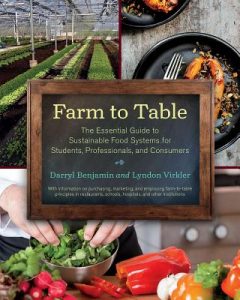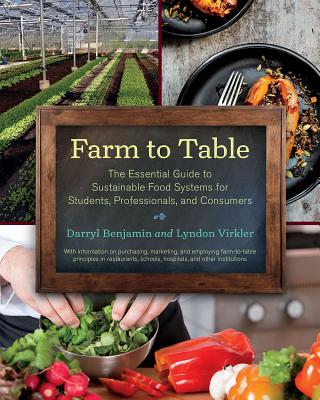Farm to Table: The Essential Guide to Sustainable Food Systems for Students, Professionals, and Consumers, Darryl Benjamin and Lyndon Virkler (Chelsea Green, 2016)
 The term “Farm-to-Table” is at risk of becoming just another marketing concept or descriptive terminology no longer connected to food, farms, or even tables.
The term “Farm-to-Table” is at risk of becoming just another marketing concept or descriptive terminology no longer connected to food, farms, or even tables.
In Farm to Table: The Essential Guide to Sustainable Food Systems for Students, Professionals, and Consumers, the authors define the term as encompassing core concepts with a commitment to:
- Fresh, wholesome, flavorful food
- Support for local farmers and producers and the rights of farm and food industry workers
- Sustainable farming and fishing practices and humane animal husbandry
- Local economies
The book is comprised of two main sections: Farm and Table, where the “Farm” segment focuses on the environment, industrial ag, monocropping, CAFOs, and the future of farming, and the “Table” segment addresses restaurants, local purchasing, green restaurant practices, school and institutional food service, and marketing the concept of Farm-to-Table.
As so often happens in books attempting to address multiple complex issues, it is “a mile wide and an inch deep” – essentially an encyclopedia. The benefit of an encyclopedia is that one can use the information as a jumping off point to research an issue in more depth.
We are facing a time when “students, professionals, and consumers” need to learn in detail about applying these concepts in their lives, wherever they are in the food system, whether they grow, process, package, prepare, market, purchase, and – most certainly – consume it.
In the opening chapter, titled “The Environmental Costs of Industrial Agriculture,” the overarching issue of climate change gets only about 500 words and fossil fuel use gets just 300 more.
Chapter One closes with: “A diet that comes from industrial agriculture influences global warming because the food we eat is inextricably linked to the consumption of fossil fuels and the production of greenhouse gases.” The solution? “By supporting producers that minimize inputs and use production methods designed to limit climate change, consumers can make a more lasting impact.”
Farm to Table may be useful as a high-level summary of wide variety of food and farming issues, however it provides a very little detail and real practical advice. And as an encyclopedia it is very rapidly dated.
Use it as a launch point for a discussion of food system dynamics, but don’t depend on it to provide resolutions – or even recommendations – to deal with the deep and difficult challenges we face with climate change as we try to build security back into our food system.
(Get your copy here. Indiebound will connect you with a bookseller online or on the street.)

